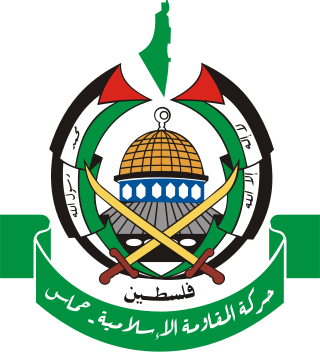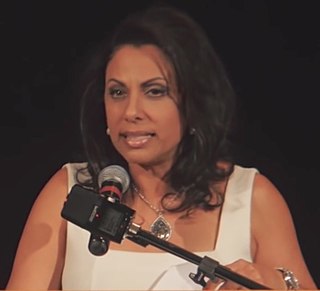
Hamas, an acronym of its official name, Harakat al-Muqawama al-Islamiya, is a Palestinian Sunni Islamist political and military organisation governing parts of the Israeli-occupied Gaza Strip since 2007.

Zionist political violence refers to acts of violence or terrorism committed by Zionists in support of establishing and maintaining a Jewish state in Palestine. These actions have been carried out by individuals, paramilitary groups, and the Israeli government, from the early 20th century to the present day, as part of the ongoing Israeli-Palestinian conflict.
This timeline of the Israeli–Palestinian conflict lists events from 1948 to the present. The Israeli–Palestinian conflict emerged from intercommunal conflict in Mandatory Palestine between Palestinian Jews and Arabs, often described as the background to the Israeli–Palestinian conflict. The conflict in its modern phase evolved since the declaration of the State of Israel on May 14, 1948 and consequent intervention of Arab armies on behalf of the Palestinian Arabs.
Information warfare (IW) is the battlespace use and management of information and communication technology (ICT) in pursuit of a competitive advantage over an opponent. It is different from cyberwarfare that attacks computers, software, and command control systems. Information warfare is the manipulation of information trusted by a target without the target's awareness so that the target will make decisions against their interest but in the interest of the one conducting information warfare. As a result, it is not clear when information warfare begins, ends, and how strong or destructive it is.
Cyberterrorism is the use of the Internet to conduct violent acts that result in, or threaten, the loss of life or significant bodily harm, in order to achieve political or ideological gains through threat or intimidation. Emerging alongside the development of infomration technology, cyberterrorism involves acts of deliberate, large-scale disruption of computer networks, especially of personal computers attached to the Internet by means of tools such as computer viruses, computer worms, phishing, malicious software, hardware methods, and programming scripts can all be forms of internet terrorism. Some authors opt for a very narrow definition of cyberterrorism, relating to deployment by known terrorist organizations of disruption attacks against information systems for the primary purpose of creating alarm, panic, or physical disruption. Other authors prefer a broader definition, which includes cybercrime. Participating in a cyberattack affects the terror threat perception, even if it isn't done with a violent approach. By some definitions, it might be difficult to distinguish which instances of online activities are cyberterrorism or cybercrime.
Walter Ze'ev Laqueur was a German-born American historian, journalist and political commentator. He was an influential scholar on the subjects of terrorism and political violence.
Mark A. Gabriel is an Egyptian-American lecturer and writer on Islam who lives in the United States. He is the author of five books critical of Salafi Islam, including Islam and Terrorism, Islam and the Jews, and Journey into the Mind of an Islamic Terrorist.
Jewish extremist terrorism is terrorism, including religious terrorism, committed by extremists within Judaism.
Al-Fateh was an online children's magazine in Arabic. It began publication in September 2002, and its 108th issue was released in mid-September 2007. The magazine featured stories, poems, riddles, and puzzles.

Brigitte Gabriel is a Lebanese-American conservative activist, author and lecturer, and critic of Islam. She is the founder of ACT for America, an advocacy group that opposes Islamic extremism.
Terrorist tactics tend to favor attacks that avoid effective countermeasures and exploit vulnerabilities.
Raphael Israeli is an Israeli historian and writer. He is a professor emeritus of Middle Eastern, Islamic and Chinese history at the Hebrew University of Jerusalem, as well as a research fellow at Truman Institute for the Advancement of Peace and the Jerusalem Center for Public Affairs.
Evan F. Kohlmann is an American terrorism consultant who has worked for the FBI and other governmental organizations.
Sami Hadawi was a Palestinian scholar and author. He is known for documenting the effects of the 1948 Arab–Israeli War on the Arab population in Palestine and publishing statistics for individual villages prior to Israel's establishment. Hadawi worked as a land specialist until he was exiled from Jerusalem after a fierce battle in his neighborhood between Israeli and Jordanian forces. He continued to specialize in documenting Palestine's lands and published several books about the 1948 Palestine war and the Palestinian refugees.

Nitsana Darshan-Leitner is an Israeli attorney, human rights activist, and the founder of Shurat HaDin – Israeli Law Center. As the president of the Shurat HaDin, she has represented hundreds of terror victims in legal actions against terror organizations and their supporters. Darshan-Leitner initiated a legal campaign to deprive terrorists of social media resources such as Facebook and Twitter. Darshan-Leitner assisted in blocking the Gaza Freedom Flotilla.

Bruce R. Hoffman is an American political analyst. He specializes in the study of terrorism, counter-terrorism, insurgency, and counter-insurgency. Hoffman serves as the Shelby Cullom and Kathryn W. Davis Senior Fellow for Counterterrorism and Homeland Security on the Council on Foreign Relations, and is a professor at the School of Foreign Service of Georgetown University. In addition, he is the Professor Emeritus and Honorary Professor of Terrorism Studies at the University of St Andrews, and is the George H. Gilmore Senior Fellow at the U.S. Military Academy's Combating Terrorism Center.





